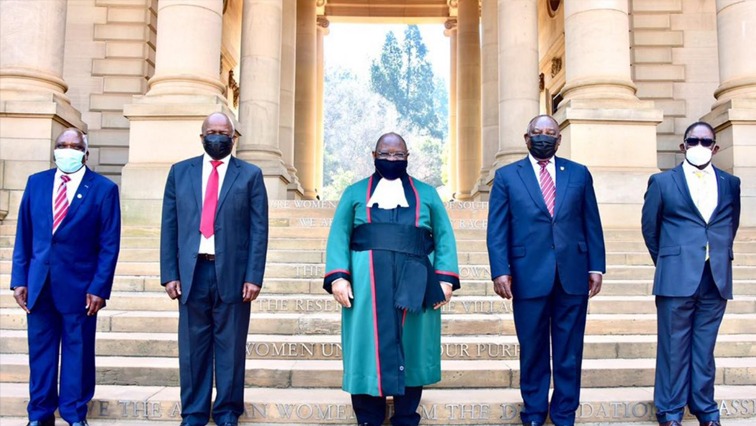After General Elections and seats in Parliament are allocated according to parties proportionally based on the votes they have received, Members of Parliament deployed by various parties take an oath of office, affirming their faithfulness to the republic in discharging their duties in accordance with Schedule 2 of the Constitution.
Affirmation on Schedule 2 (4) of the Constitution is based on the notion of the separation of powers – the Legislature (National Assembly – Parliament) makes laws on behalf of the citizens and monitor that government – the Executive (President, Deputy President Ministers and Deputy Ministers), takes through and implements these laws; this monitoring role presupposes a certain degree of independence from the Executive – independence which is meant to enable the Legislature to be critical of the Executive and that MPs must hold it accountable and ensure that that they act in line with the constitution when executing their duties.
The role of Parliament is law-making and conducting oversight, the notion of accountability on the Executive. This means that issues affecting the lives of the people are shaped and driven by Parliament, as such, it ought to be representative and work in line with the Constitution.
The South African Constitution obligates the government to be based on the will and best interests of the people whose duties are guided by the dreams, aspirations, and wellbeing of the general public on all levels. The effective and efficient role of the citizens in the political discourse of the country is of paramount importance for people to believe in the idea of a social contract, its institutions, and its rules.
However, despite what appears to be a perfectly designed democratic system, there is a problem of separation of powers or lack thereof. After the July unrest that saw the looting of businesses, destruction of property, and loss of lives, it was clear that heads were going to roll.
And so, it was that President Cyril Ramaphosa reshuffled his Cabinet. It was more shuffling the same pack of cards around – moving Ministers and Deputy Ministers around as only Nosiviwe Mapisa-Nqakula was ‘fired’ from Cabinet after Tito Mboweni and Dr. Zweli Mkhize ‘tendered in their resignations.
This was seen as President Ramaphosa unleashing the whip for the security cluster’s failed response to the aforementioned unrest. She was replaced by Speaker of the National Assembly, Thandi Modise.
The doctrine of the separation of powers fundamentally means no arm of the State should interfere with the other; reconfiguration of the Executive should not have any bearing on the Legislature as an independent arm of the State. The inability to separate the two arms diminishes South Africa’s Constitutional democratic order and disregards the importance of the Legislature.
If this continues, we run the risk of weakening our democracy by failing to value the doctrine of the separation of powers, its development, and transformative purposes, in particular.
As alluded to earlier, Nosiviwe Mapisa-Nqakula’s axing from the cabinet was because of the lack of coordinated effort by the security cluster to the July unrest and publicly contradicting the President on the issue, as such it would be plausible to think that ANC’s Cadre Deployment would, in assessing deployment options for the veteran politician, take that into consideration.
In the words of President Cyril Ramaphosa, “Minister Nosiviwe Mapisa-Nqakula will be deployed to a new position”. I would’ve assumed that she was going to be given a diplomatic post since that aspect of our government has been relegated to the deployment of members of the ruling party for a ‘cooling-off period’ after transgressions.
On August 10, however, the former Defence Minister was nominated by the ANC to be the Speaker of Parliament – the 3rd most powerful position in the country. At face value, it seemed as though being removed from cabinet was punishment, and, like any other workplace environment, would be demoted for poor performance.
The nomination, however, shows us that the cabinet reshuffle was not about reconfiguring the National Executive to create a much more responsive government – it was a factional deployment – setting the scene. It was more of political maneuvering rather than governance-related.
The President is trying, by all means, to balance the forces within the ANC ahead of the elective conference next year in December – threading carefully, focusing on the optics of the ruling party -at the cost of the country.
The cabinet reshuffle was about the realignment of ANC factions rather than improving service delivery and the effective coordination of government in discharging its Constitutional duties.
British-American author, Simon Sinek once said, “Leadership is not about the next election, it’s about the next generation”. Politics as a discipline teaches us that the primary objective of any state is the welfare of its people. Not in South Africa – here it is the African National Congress first. That’s what the events of the past few days have shown us.
Vusi Gumbi is a Masters candidate in Politics at the University of Johannesburg and the Winner of One Day Leader Season 8


